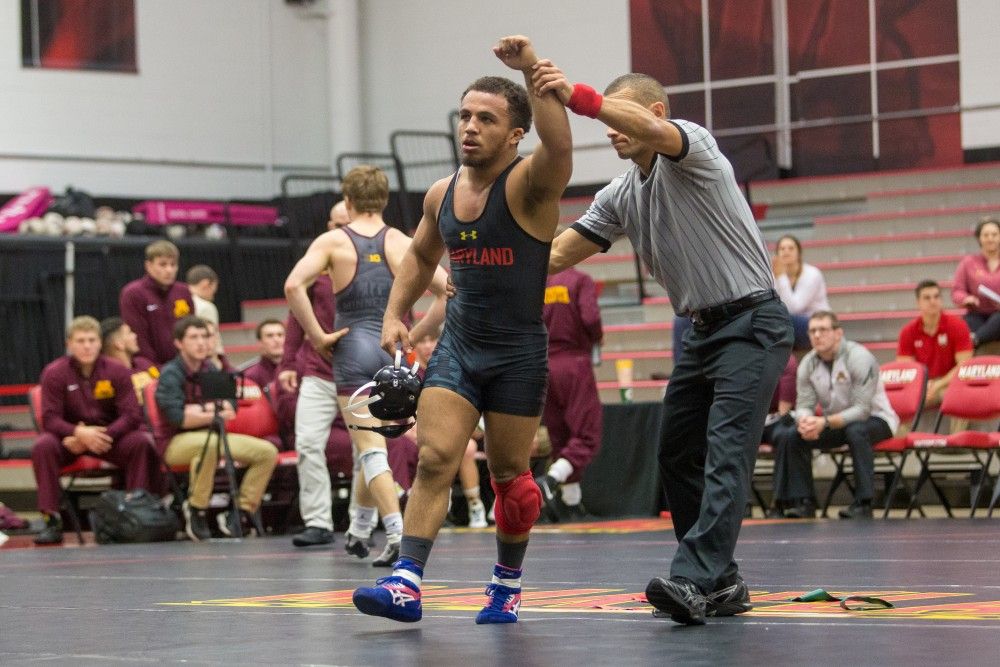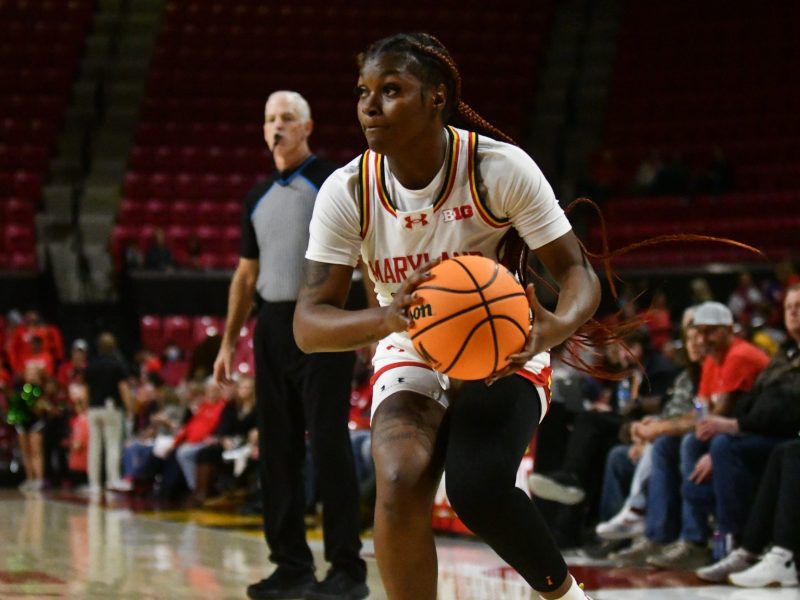The Maryland wrestling team is stuck in a hapless rut.
For their sixth straight dual, the Terps dug themselves into an insurmountable deficit that gave them no chance to recover.
In what was considered to be one of the toughest duals on Maryland’s schedule, the Terps lost to No. 7 Nebraska, 38-6, as they continue to search for their first win of the season.
Maryland (0-6, 0-3 Big Ten) saw its smaller weights struggle as they have all season, with both 125-pounder Brandon Cray and 141-pounder Michael Doetsch falling to their counterparts in major decision victories for Nebraska (8-2, 2-1).
Even so, the Terps were able to keep numerous matchups within striking distance, which coach Kerry McCoy hopes is a positive sign as the team looks ahead.
“I think we performed better than we did the last time and against a better team,” McCoy said. “We saw a little bit more fight.”
Freshman 133-pounder Orion Anderson wrestled hard against fellow freshman Jevon Parrish, and the two were seemingly tied late into the third period. However, a controversial late scoring change found that Parrish was actually ahead in the match, much to the dismay of McCoy. Anderson went on to lose the match by a score of 9-5.
As he’s done in most of Maryland’s duals this season, 149-pounder Alfred Bannister got the Terps on the board with a thrilling 5-3 victory over Nebraska’s Jordan Shearer. The two had been tied for much of the bout, but a late third period takedown by the La Plata native secured the Terps’ first win of the dual.
While Maryland has often dug itself early holes, Bannister has embraced his role of providing a spark by giving the Terps their first points nearly every match.
“It’s a lot of pressure but it’s needed,” Bannister said. “If not me, then who? I accept the responsibility.”
157-pounder Adam Whitesell was excited for the opportunity to face Nebraska’s Tyler Berger, the No. 2 157-pounder in the country, but he quickly found out why Berger is one of the best. After a quick flurry of takedowns of Whitesell, Berger took control and pinned him at the end of the first period.
Coming out of intermission, the Terps’ fight remained, but the results were much of the same.
165-pounder Philip Spadafora nearly pulled off a huge upset over No. 6 Isaiah White after throwing him to his back in the second period. With the crowd behind him, Spadafora battled back again in the third but his furious rally came up just short, losing by a score of 14-10.
McCoy admitted that Spadafora was hesitant in believing he could pull off such an upset, and that mindset is an important part of wrestling.
“I asked him, ‘Did you think you going into the match that you could beat that guy?’ And he said no,” McCoy said. “Imagine if you would’ve believed that you could beat him. It might’ve been the difference.”
Maryland was forced to forfeit the 174-pound bout after it was deemed that normal starter Josh Ugalde could not go. The redshirt junior injured his hamstring late against Purdue on Jan. 11.
McCoy was non-committal on Ugalde’s status going forward but did acknowledge that he’s progressing well.
“He’s making his way back,” he said. “Hopefully he’ll be good to go next week. Hamstrings are tricky.”
Both 184-pounder Kyle Jasenski and 197-pounder Niko Cappello struggled in their matchups, with Jasenski losing by pinfall and Cappello falling by technical fall.
The only ranked vs. ranked matchup came at heavyweight, which saw No. 6 Youssif Hemida take on No. 14 David Jensen. The Terps’ senior captain eventually prevailed in the back-and-forth affair after a late takedown in the third period.
Hemida won in large part due to his superior stamina.
“I usually think when I wrestle hard and wrestle my match, the other guy will get tired,” Hemida said. “I trust in my conditioning.”
However, the all-too-familiar scenario of Maryland not finding ways to string wins together doomed the team as it has in each of its six duals.
Bannister and Hemida are clearly bright spots, but the Terps will need other wrestlers to step up if they aim to be competitive in their dual matches.



